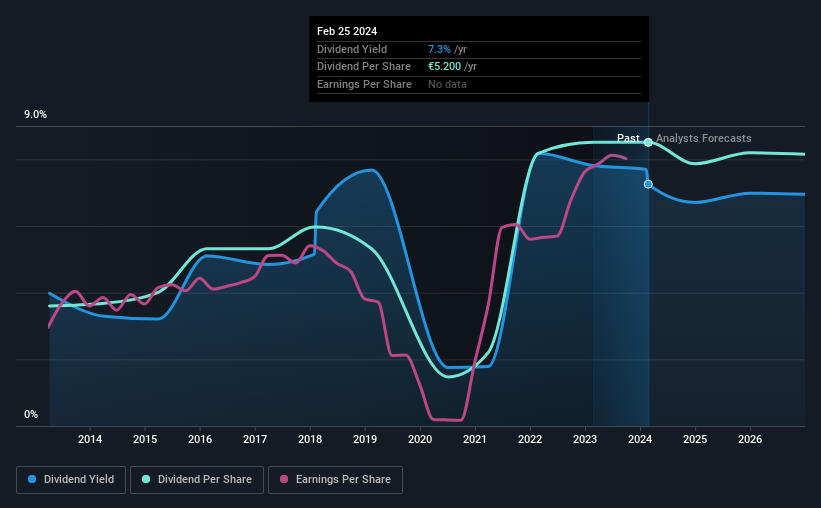Mercedes-Benz Group (ETR:MBG) Will Pay A Larger Dividend Than Last Year At €5.30

Mercedes-Benz Group AG (ETR:MBG) has announced that it will be increasing its periodic dividend on the 13th of May to €5.30, which will be 1.9% higher than last year's comparable payment amount of €5.20. Based on this payment, the dividend yield for the company will be 7.3%, which is fairly typical for the industry.
See our latest analysis for Mercedes-Benz Group
Mercedes-Benz Group's Earnings Easily Cover The Distributions
We like to see a healthy dividend yield, but that is only helpful to us if the payment can continue. But before making this announcement, Mercedes-Benz Group's earnings quite easily covered the dividend. However, with more than 75% of free cash flow being paid out to shareholders, future growth could potentially be constrained.
Looking forward, earnings per share is forecast to fall by 11.0% over the next year. If the dividend continues along recent trends, we estimate the payout ratio could be 43%, which we consider to be quite comfortable, with most of the company's earnings left over to grow the business in the future.

Dividend Volatility
The company has a long dividend track record, but it doesn't look great with cuts in the past. Since 2014, the dividend has gone from €2.20 total annually to €5.20. This implies that the company grew its distributions at a yearly rate of about 9.0% over that duration. A reasonable rate of dividend growth is good to see, but we're wary that the dividend history is not as solid as we'd like, having been cut at least once.
The Dividend Looks Likely To Grow
Growing earnings per share could be a mitigating factor when considering the past fluctuations in the dividend. We are encouraged to see that Mercedes-Benz Group has grown earnings per share at 12% per year over the past five years. With a decent amount of growth and a low payout ratio, we think this bodes well for Mercedes-Benz Group's prospects of growing its dividend payments in the future.
Our Thoughts On Mercedes-Benz Group's Dividend
Overall, we always like to see the dividend being raised, but we don't think Mercedes-Benz Group will make a great income stock. The low payout ratio is a redeeming feature, but generally we are not too happy with the payments Mercedes-Benz Group has been making. We would be a touch cautious of relying on this stock primarily for the dividend income.
Investors generally tend to favour companies with a consistent, stable dividend policy as opposed to those operating an irregular one. At the same time, there are other factors our readers should be conscious of before pouring capital into a stock. To that end, Mercedes-Benz Group has 3 warning signs (and 2 which don't sit too well with us) we think you should know about. If you are a dividend investor, you might also want to look at our curated list of high yield dividend stocks.
If you're looking to trade Mercedes-Benz Group, open an account with the lowest-cost platform trusted by professionals, Interactive Brokers.
With clients in over 200 countries and territories, and access to 160 markets, IBKR lets you trade stocks, options, futures, forex, bonds and funds from a single integrated account.
Enjoy no hidden fees, no account minimums, and FX conversion rates as low as 0.03%, far better than what most brokers offer.
Sponsored ContentNew: Manage All Your Stock Portfolios in One Place
We've created the ultimate portfolio companion for stock investors, and it's free.
• Connect an unlimited number of Portfolios and see your total in one currency
• Be alerted to new Warning Signs or Risks via email or mobile
• Track the Fair Value of your stocks
Have feedback on this article? Concerned about the content? Get in touch with us directly. Alternatively, email editorial-team (at) simplywallst.com.
This article by Simply Wall St is general in nature. We provide commentary based on historical data and analyst forecasts only using an unbiased methodology and our articles are not intended to be financial advice. It does not constitute a recommendation to buy or sell any stock, and does not take account of your objectives, or your financial situation. We aim to bring you long-term focused analysis driven by fundamental data. Note that our analysis may not factor in the latest price-sensitive company announcements or qualitative material. Simply Wall St has no position in any stocks mentioned.
About XTRA:MBG
Mercedes-Benz Group
Operates as an automotive company in Germany and internationally.
Undervalued established dividend payer.


